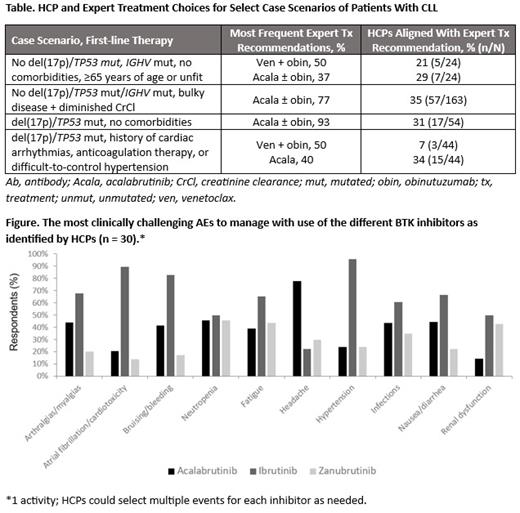Background: Targeted therapies have revolutionized the care of patients with chronic lymphocytic leukemia (CLL). In this context, new evidence continues to accumulate with the goal of optimizing the clinical use of these treatments as additional novel therapeutics continue to emerge. In this study, we sought to analyze current clinical practices of healthcare professionals (HCPs) regarding the care of patients with CLL, along with their awareness of the latest evidence on novel investigational therapies for these patients.
Methods: Between March 2022 and June 2023, we conducted multiple live and online continuing medical education activities designed for experts to provide HCPs with evidence-based recommendations for the treatment of CLL. Baseline polling questions and surveys designed to assess key aspects of HCP knowledge, practice patterns, and confidence in this area were assessed across the activities.
Results: Among 124 HCPs participating in educational activities between September 2022 and June 2023, 40% reported high confidence in their ability to plan optimal treatment strategies using BTK inhibitors for patients with CLL based on available evidence and guideline and expert recommendations. There was considerable discordance between HCP and expert treatment choices for various case scenarios in multiple educational activities; for example, for patient cases without del(17p)/ TP53-mutated/ IGHV-mutated CLL andbulky disease with diminished creatinine clearance, experts would recommend acalabrutinib with or without obinutuzumab for 77% of scenarios, while HCPs selected this treatment 35% of the time (Table).
Among 57 HCPs who participated in educational programs from March 2022 to February 2023, 26% reported high confidence in their ability to recognize and manage AEs with BTK inhibitors in patients with CLL. Challenging AEs associated with the currently available BTK inhibitors also were self-identified by HCPs (Figure). One half of responding HCPs (52%) were able to identify characteristics that would qualify a patient for inpatient administration of the initial doses of venetoclax because of increased risk of tumor lysis syndrome (n = 48).
Finally, among 213 HCPs participating in educational activities from September 2022 to June 2023, 43% were aware of recent data regarding the use of pirtobrutinib, an investigational noncovalent BTK inhibitor, for treating patients with CLL.
Conclusion: Our data suggest that many HCPs are challenged to optimally incorporate contemporary treatment recommendations into the care of patients with CLL and struggle to maintain knowledge of investigational therapies that may affect the treatment landscape in the near future. Continuing educational activities designed to improve the knowledge, competence, and confidence of HCPs in the care of CLL would benefit patients with this disease. A more detailed data analysis of treatment trends and knowledge by geographic location and role on the care team will be presented.
Disclosures
Lamanna:Abbvie: Consultancy, Research Funding; AstraZeneca: Consultancy, Research Funding; BeiGene: Consultancy, Research Funding; Genentech: Consultancy, Research Funding; Janssen: Consultancy; Octapharma: Research Funding; Oncternal: Research Funding; MingSight: Research Funding; Pharmacyclics: Consultancy; Eli Lilly/Loxo: Research Funding; Adaptive Biotechnologies: Consultancy; TG Therapeutics: Research Funding. Sharman:Merck, Novartis: Consultancy; Seattle Genetics: Research Funding; AbbVie, AstraZeneca, BeiGene, BMS, Genentech, Inc., Lilly: Consultancy; AbbVie, AstraZeneca, BMS, Beigene, Lilly, Genentech, Inc., Genmab: Consultancy.


This feature is available to Subscribers Only
Sign In or Create an Account Close Modal